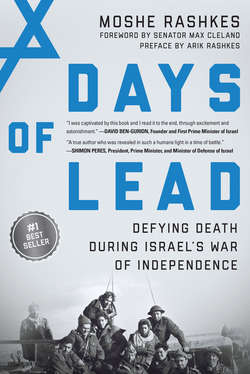Читать книгу Days of Lead - Moshe Rashkes - Страница 3
На сайте Литреса книга снята с продажи.
Foreword By Senator (Ret.) Max Cleland
ОглавлениеIt was a great honor for me to be asked to pen an introduction to this important book, which received excellent reviews and was printed in Israel in nine editions.
The greatness of this book is to be found in its atmosphere, which enables readers to identify deeply with the author, as if they themselves were on the battlefield, experiencing the terrible pain and sensation of loss.
As a combatant in 1968, I lost both legs and an arm in the Vietnam War. The US government awarded me Bronze and Silver Stars for valorous actions in combat. Following my rehabilitation, I felt the need to serve the American public, first as secretary of state for Georgia, and later as a US senator.
So why am I writing about this particular book? Not just because Moshe Rashkes is a close personal friend, or because the book’s subject matter is close to my heart and my difficult life experiences. It seems that every meeting with the Angel of Death, and every escape from his clutches, lead to enormous changes in the soul of an individual. For most, these changes result in a desire to make things better for humanity and, in wartime, to help one’s fellow combatants.
Moshe followed the same path as I did. Even while hospitalized, following his war injuries, he was among the originators of the Israel Disabled War Veterans Organization, fighting for the rights of injured veterans. Later, after eight years as chairman of this organization, he joined the founders of the Israel Sport Center for the Disabled (ISCD) in Ramat Gan, which became a pioneering sports center for disabled individuals. He served as director of the ISCD for thirty-seven years, and then as chairman in a voluntary capacity for many more years.
I followed a similar path, first as secretary of state for Georgia, then as administrator of the United States Veterans Administration, serving wounded veterans, then as senator for Georgia, fighting—among other things—for the social rights of the disabled and, finally, as secretary of the American Battle Monuments Commission.
I find a strong similarity between this book and my own book, Strong at the Broken Places, written after my own terrible war injuries.
These two books, in my opinion, complete and complement each other. Moshe’s book clearly articulates the sensation of pain and the feeling of approaching death, while my book describes overcoming life-changing shock and loss. Both ultimately celebrate triumph and the power of the human spirit. It is important for every person to know about these things, especially the world’s leaders, in whose hands world peace—or war—rests.
The uniqueness of this book is that it gives the reader a precise and realistic view of the horrors of war, and the feelings of the individual who is engulfed by it.
